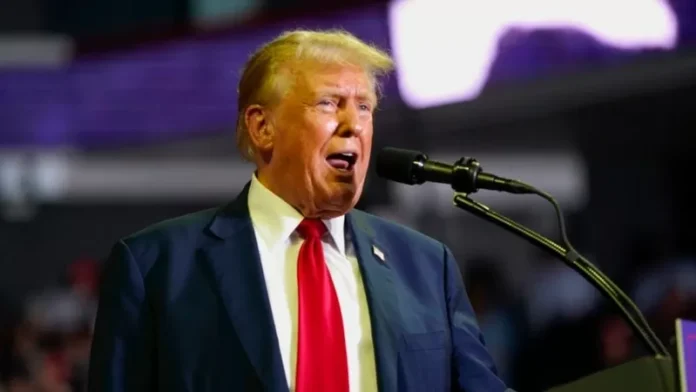Washington — In 2016, Donald Trump’s presidential campaign was filled with promises to crush “radical Islamic terrorism.” However, as he seeks a second term in the White House, Trump’s focus has shifted away from this rhetoric and towards other domestic issues such as immigration and crime.
This change in tone was highlighted on Sunday when a coordinated terrorist attack in southern Russia left at least 20 people dead. In the past, this may have prompted a flurry of tweets from Trump, but now it went unmentioned on his Truth Social platform.
So why the silence on what was once a rallying cry for Trump? Experts suggest two factors: a decrease in public concern about terrorism and a strategic play for the Muslim American vote.
Brian Levin, an extremism expert who closely followed Trump’s rhetoric, believes that Trump is now focusing on issues that resonate with voters. “Eight years ago, when the threat of foreign-inspired extremism was a top concern for voters, Trump successfully used terror attacks to drum up support,” Levin said. “But today, he has to pivot to domestic issues such as the economy, democracy, crime, and the border, as well as the record of the incumbent he hopes to unseat.”
In response, President Joe Biden has made protecting democracy a centerpiece of his campaign, portraying Trump as a grave threat to the country. However, Biden’s strong support for Israel during its recent military campaign in Gaza has angered many Muslim voters, creating a rare opportunity for Trump to gain their support.
Gabriel Rubin, a justice studies professor at Montclair State University, believes that Trump may be targeting the Muslim vote in key battleground states with large Muslim populations that could determine the outcome of the November election. “He has an avenue to not mention ‘radical Islamic terrorism’ too much,” Rubin said in an interview with VOA. “I think he can win some of these Midwestern states if he plays his cards right.”
Despite the decrease in public concern about terrorism, the threat of international terrorism still remains. In the months since the outbreak of conflict in Gaza, U.S. officials, including FBI Director Christopher Wray, have warned of an increased potential for terrorist attacks.
However, according to an April Gallup report, overall concern about terrorism does not match the higher levels it garnered in 2015 and 2016. This is due in part to Trump’s 2016 campaign rhetoric, which included claims that “Muslims hate us” and calls for a “complete and total” shutdown of Muslims entering the country.
Trump’s vitriolic comments about Muslims and Islam, while welcomed by his supporters, have unnerved many in the Muslim community and drawn charges of Islamophobia against him, which he and his allies reject. VOA reached out to the Trump campaign for comment but did not receive a response. The Biden campaign also did not respond to a request for comment.
Biden’s stance on terrorism, particularly Islamist terrorism, has also evolved over the years. While he is not known to have used the phrase “radical Islamic terrorism,” in the past he was more willing to use similar language while taking a tough stance on terrorism.
In 2014, as vice president under President Barack Obama, he criticized Turkey and the United Arab Emirates for supporting jihadi groups in Syria and “the extremist elements of jihadis coming from other parts of the world.” He later apologized for the comment.
Since becoming president in 2021, Biden has focused on terrorism more broadly without singling out any one region or religion, moving away from the rhetoric of the “War on Terror” of the 2000s. On his first day in office, he repealed the Trump administration’s “Muslim ban,” calling it “a stain on our national conscience.”
In the wake of the January 6 attack on the U.S. Capitol, his administration has placed a greater emphasis on domestic terrorism as a significant threat to homeland security. In 2021, they launched the first-ever national strategy for countering domestic terrorism.
After the October 7 Hamas attack, Biden condemned it as “pure, unadulterated evil” while distancing the perpetrators from the broader Muslim community. “I know many of you in the Muslim American community or the Arab American community, the Palestinian American community, and so many others are outraged and hurting, saying to yourselves, ‘Here we go again,’ with Islamophobia and distrust we saw after 9/11,” Biden said on October 10.
Trump is not

